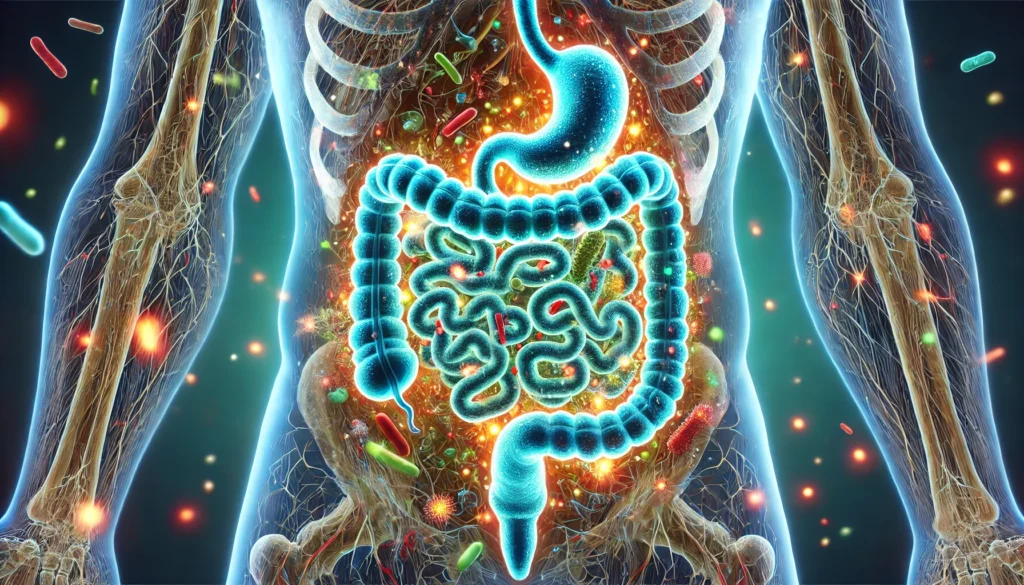Understanding Gut Health and Its Importance
The human gut is more than just a digestive system; it is a complex ecosystem teeming with trillions of bacteria, fungi, and other microorganisms that play a critical role in overall health. This diverse community, known as the gut microbiome, affects everything from digestion and metabolism to immune function and mental well-being. When balanced, the gut microbiome supports optimal health, but when disrupted, it can contribute to various health issues, including digestive disorders, autoimmune diseases, and even mental health conditions.
You may also like: Ombre (Formerly Thryve Gut Health) vs Medicine Man Plant Co.’s The Gut Pill
Understanding how to improve gut health naturally is essential for maintaining a strong microbiome. The gut microbiome’s composition is influenced by several factors, including diet, lifestyle, medication use, and stress levels. While some of these factors are beyond our control, making intentional choices about food, exercise, and stress management can significantly impact gut health. Scientific research continues to uncover the intricate connections between gut health and overall wellness, reinforcing the need for proactive gut care.
A well-balanced gut microbiome is characterized by a high diversity of beneficial bacteria that contribute to digestion, nutrient absorption, and immune defense. When this balance is disrupted, symptoms of bad gut health, such as bloating, constipation, diarrhea, and fatigue, may arise. Furthermore, an unhealthy gut has been linked to chronic inflammation, which is associated with numerous health conditions, including heart disease, obesity, and depression. By adopting strategies that support a healthy gut microbiome, individuals can enhance their overall well-being and reduce the risk of disease.
Signs of an Unhealthy Gut and the Need for a Reset
Recognizing the signs of bad gut health is the first step in making meaningful changes. Common symptoms of an imbalanced gut include persistent digestive issues such as bloating, gas, diarrhea, constipation, and acid reflux. Additionally, individuals with poor gut health may experience unexplained fatigue, skin conditions like eczema, and frequent infections due to weakened immune function. Emerging research suggests that gut health also influences mental well-being, with imbalances being linked to anxiety, depression, and mood disorders.
One of the primary causes of an unhealthy gut is an imbalance between beneficial and harmful bacteria. Factors such as a poor diet high in processed foods, excessive sugar consumption, chronic stress, and prolonged antibiotic use can contribute to gut dysbiosis, a condition in which harmful bacteria outnumber beneficial ones. Restoring gut health requires addressing these underlying factors and implementing strategies to rebalance the microbiome.
A gut reset involves adopting a gut-friendly lifestyle that includes a nutrient-dense diet, regular physical activity, and stress management techniques. By eliminating inflammatory foods and incorporating gut-healthy foods, individuals can support the growth of beneficial bacteria and improve gut function. Additionally, incorporating probiotics, prebiotics, and fermented foods can help restore gut flora and enhance digestive health.

The Best Foods for Gut Health and a Healthy Gut Diet
Diet plays a crucial role in shaping the gut microbiome. Consuming gut-healthy foods can promote microbial diversity and support overall digestive function. The best diet for gut health includes a variety of fiber-rich, nutrient-dense foods that nourish beneficial bacteria and reduce inflammation.
Fiber-Rich Foods for a Stronger Microbiome
Dietary fiber serves as fuel for beneficial gut bacteria, promoting their growth and activity. High-fiber foods such as whole grains, legumes, fruits, and vegetables contribute to a diverse microbiome and support optimal digestion. Soluble fiber, found in foods like oats, apples, and flaxseeds, helps regulate bowel movements and supports the production of short-chain fatty acids, which provide energy for gut cells. Insoluble fiber, present in foods like leafy greens and nuts, adds bulk to stool and prevents constipation.
Fermented Foods for Gut Health
Fermented foods are among the best foods for gut health because they contain live probiotics that help restore gut flora. Foods such as yogurt, kefir, sauerkraut, kimchi, and miso introduce beneficial bacteria into the gut, enhancing microbial diversity. Regular consumption of these foods can improve digestion, strengthen the immune system, and reduce inflammation.
Prebiotic Foods to Feed Good Bacteria
Prebiotics are non-digestible fibers that serve as food for beneficial gut bacteria. Including prebiotic-rich foods in the diet can enhance the growth of healthy microbes and improve gut balance. Examples of prebiotic foods include garlic, onions, leeks, asparagus, bananas, and chicory root. These foods help stimulate the production of beneficial bacteria and promote gut health naturally.
Lifestyle Factors That Influence Gut Health
Beyond diet, several lifestyle factors play a crucial role in gut health. Stress management, regular exercise, and quality sleep all contribute to a balanced microbiome. Chronic stress can negatively impact gut bacteria by increasing inflammation and altering microbial composition. Engaging in stress-reducing activities such as meditation, yoga, and deep breathing can help support gut health.
Physical activity is another essential component of a healthy gut. Regular exercise has been shown to increase microbial diversity and enhance gut barrier function. Activities such as walking, jogging, and strength training can positively influence the gut microbiome and reduce inflammation.
Sleep is equally important for gut health, as poor sleep patterns can disrupt microbial balance and impair digestion. Maintaining a consistent sleep schedule and practicing good sleep hygiene can help regulate gut function and improve overall well-being.

Frequently Asked Questions About Gut Health
1. What are the long-term effects of an unhealthy gut?
An imbalanced gut microbiome can have far-reaching consequences beyond digestion. Chronic gut health issues can contribute to systemic inflammation, which has been linked to conditions such as obesity, type 2 diabetes, cardiovascular disease, and autoimmune disorders. Additionally, poor gut health is increasingly associated with mental health issues like anxiety and depression, as the gut and brain are deeply connected through the gut-brain axis. Over time, an unhealthy gut can weaken the immune system, making the body more susceptible to infections and illnesses. Restoring gut balance through a healthy gut diet, stress management, and lifestyle adjustments can help mitigate these risks and promote long-term health.
2. How does stress impact gut health, and what can be done to counteract it?
Chronic stress negatively affects the gut microbiome by altering its composition and reducing microbial diversity. Stress hormones like cortisol can disrupt gut barrier function, leading to increased intestinal permeability, commonly known as “leaky gut.” This can trigger inflammation and contribute to digestive disorders. Engaging in stress-reduction techniques such as mindfulness meditation, yoga, and regular physical activity can help improve gut health naturally. Additionally, consuming gut-healthy foods rich in fiber and probiotics can support microbial balance and enhance resilience against stress-induced gut imbalances.
3. Can gut health affect sleep quality?
Yes, gut health plays a significant role in sleep regulation due to its influence on neurotransmitter production. The gut produces around 90% of the body’s serotonin, which is a precursor to melatonin, the hormone responsible for sleep-wake cycles. An imbalanced gut microbiome can lead to sleep disturbances, insomnia, and even conditions like restless leg syndrome. Consuming prebiotic-rich foods, maintaining a consistent sleep schedule, and avoiding excessive caffeine and processed foods can help support both gut health and better sleep. Establishing a nighttime routine that includes relaxation techniques can further enhance gut-brain communication and improve overall sleep quality.
4. How do antibiotics affect gut health, and how can you restore balance after taking them?
Antibiotics, while essential for treating bacterial infections, can disrupt gut microbiome balance by killing both harmful and beneficial bacteria. This can lead to symptoms of bad gut health, such as diarrhea, bloating, and weakened immunity. To restore gut balance after a course of antibiotics, it is crucial to consume probiotic-rich foods such as yogurt, kefir, and fermented vegetables. Additionally, eating prebiotic foods like garlic, onions, and asparagus can help feed beneficial bacteria and encourage their growth. Avoiding excessive sugar and processed foods can also support microbiome recovery and prevent further imbalances.
5. What role does hydration play in gut health?
Proper hydration is fundamental for maintaining a healthy gut as it supports digestion, nutrient absorption, and waste elimination. Water helps break down food efficiently, allowing for smoother passage through the intestines and preventing constipation. Staying hydrated also promotes the production of mucus in the digestive tract, which protects the gut lining and supports overall gut barrier integrity. Dehydration can slow digestion, leading to bloating and discomfort. Drinking adequate amounts of water throughout the day, along with herbal teas and hydrating foods like cucumbers and watermelon, can improve gut function and enhance microbiome health.
6. Can intermittent fasting improve gut health?
Intermittent fasting can be beneficial for gut health by promoting microbial diversity and allowing the gut time to rest and repair. Fasting periods give the digestive system a break, reducing inflammation and supporting gut barrier function. Research suggests that intermittent fasting can increase the abundance of beneficial bacteria and help reset gut health. However, it is essential to break fasts with nutrient-dense, gut-healthy foods rather than processed or high-sugar meals. Consulting a healthcare professional before starting intermittent fasting is recommended, especially for individuals with preexisting digestive conditions.
7. What are the best foods for gut flora diversity?
A diverse gut microbiome is key to overall health, and certain foods can help increase microbial variety. Foods rich in polyphenols, such as berries, dark chocolate, and green tea, have been shown to support beneficial bacteria growth. Additionally, fermented foods like kimchi, miso, and sauerkraut introduce live probiotics that enhance gut flora. Whole grains, legumes, and a variety of colorful fruits and vegetables provide fiber and prebiotics that nourish gut bacteria. Rotating foods regularly instead of eating the same meals daily can further enhance microbiome diversity and improve gut health naturally.
8. How does gut health impact metabolism and weight management?
Gut health plays a crucial role in metabolism and weight regulation due to its influence on energy extraction and fat storage. A well-balanced gut microbiome helps regulate blood sugar levels, appetite, and fat metabolism. Conversely, an imbalance in gut bacteria has been linked to obesity and metabolic disorders. Consuming gut health foods, such as those high in fiber and fermented foods, can support metabolic efficiency and prevent weight gain. Additionally, regular physical activity and reducing intake of processed foods can help maintain a healthy gut and support sustainable weight management.
9. Are there specific foods to avoid for better gut health?
Certain foods can disrupt gut balance and should be minimized for optimal gut health. Highly processed foods, artificial sweeteners, and excessive sugar can negatively impact beneficial gut bacteria and contribute to inflammation. Refined carbohydrates, such as white bread and sugary cereals, can promote the growth of harmful bacteria and lead to digestive discomfort. Excessive alcohol consumption and fried foods can also impair gut barrier function and increase intestinal permeability. Prioritizing a gut health diet rich in whole, unprocessed foods can support a thriving microbiome and enhance overall digestive function.
10. How can I balance my gut without taking supplements?
While probiotic and prebiotic supplements can be helpful, it is possible to improve gut microbiome health naturally through dietary and lifestyle changes. Eating a diverse range of plant-based foods, incorporating fermented foods, and consuming fiber-rich meals can help balance the gut without relying on supplements. Regular exercise has also been shown to enhance gut flora diversity and support digestive function. Managing stress through meditation, deep breathing, and quality sleep further contributes to a well-balanced gut. Making these holistic changes can naturally increase good bacteria in the gut and promote long-term gut health without the need for additional supplementation.

How to Improve Gut Health Naturally and Sustainably
Making sustainable changes to improve gut health requires a holistic approach that includes diet, lifestyle, and mindful habits. Eating a diverse range of plant-based foods, staying hydrated, and avoiding processed foods are foundational steps in supporting gut health naturally. Incorporating probiotics and prebiotics, reducing stress, and getting adequate rest further enhance gut function.
For individuals experiencing persistent gut health issues, seeking guidance from a healthcare professional can provide personalized recommendations. In some cases, microbiome medication for people who have unhealthy guts may be necessary to address severe imbalances. However, for most individuals, adopting a gut-friendly lifestyle is sufficient to restore and maintain a healthy microbiome.
By understanding how to improve gut microbiome diversity and incorporating gut-healthy habits into daily life, individuals can enhance their digestive health, boost immunity, and promote overall well-being. Taking proactive steps to support gut health naturally can lead to long-term health benefits and improved quality of life.
gut microbiome balance, digestive health tips, probiotics and prebiotics, natural gut healing, gut-friendly nutrition, microbiome support, holistic digestive wellness, intestinal health strategies, fermented foods benefits, gut-brain connection, anti-inflammatory diet for digestion, restoring gut flora, healthy digestion habits, fiber-rich diet for gut health, immune system and gut, improving digestion naturally, whole foods for gut wellness, gut-friendly meal planning, stress and gut health, optimal microbiome diversity
Further Reading:
How to improve your gut health and gut microbiome
Elucidating the role of diet in maintaining gut health
Influence of Foods and Nutrition on the Gut Microbiome and Implications for Intestinal Health
Disclaimer
The information contained in this article is provided for general informational purposes only and is not intended to serve as medical, legal, or professional advice. While Health11News strives to present accurate, up-to-date, and reliable content, no warranty or guarantee, expressed or implied, is made regarding the completeness, accuracy, or adequacy of the information provided. Readers are strongly advised to seek the guidance of a qualified healthcare provider or other relevant professionals before acting on any information contained in this article. Health11News, its authors, editors, and contributors expressly disclaim any liability for any damages, losses, or consequences arising directly or indirectly from the use, interpretation, or reliance on any information presented herein. The views and opinions expressed in this article are those of the author(s) and do not necessarily reflect the official policies or positions of Health11News.


